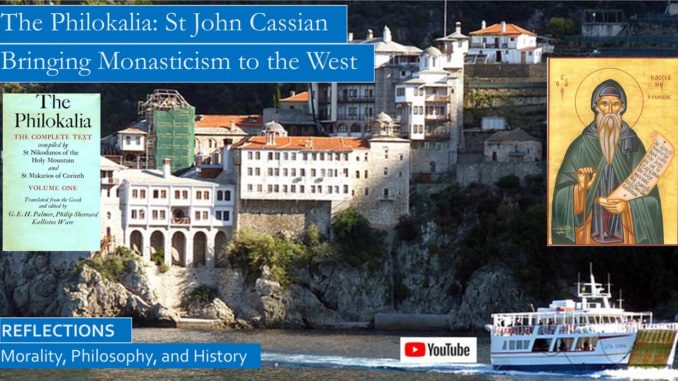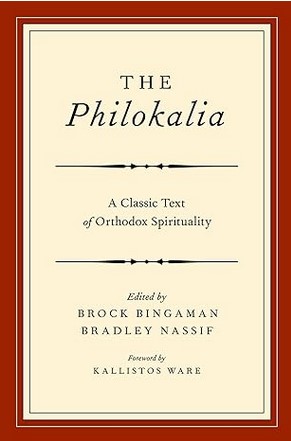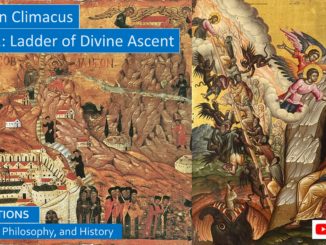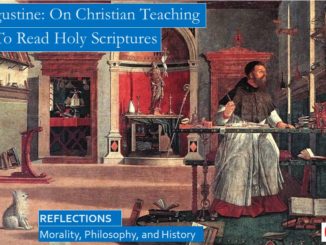
We must not only watch what we eat, we must watch what we think, as we seek to conquer the next vice, the demon of unchastity and the desire of the flesh. St John Cassian teaches, “Bodily fasting is not enough to bring about perfect self-restraint and true purity; it must be accompanied by contrition of heart, intense prayer to God, frequent meditation on Scriptures, toil and manual labor. . . Humility of soul helps more than anything else. . . We must take the utmost care to guard the heart from base thoughts.” Contrition and humility comes from sincere confession and repentance.
In contrast, what does the world encourage? Be passionate, give in to your passions, you are not alive if you are not passionate! How much thought do we give to the junk we watch on television and in the movies, to the radio stations we listen to? What spiritual messages does this media blare? If the Church Fathers were to live today, what would they tell us about television and the movies? Entertainment is not all bad, but should entertainment be the focus of our life? St. John Cassian warns that if our lustful and impure “thoughts grow stronger because we assent to them, we will not be able to overcome them without much pain and labor.”
YouTube video: https://youtu.be/BDzxATWWdyY
St John Cassian Blog 1 http://www.seekingvirtueandwisdom.com/john-cassian-and-the-vice-of-gluttony-blog-1/
The Church Fathers list the vices of gluttony, unchastity, avarice, anger, dejection, listlessness, self-esteem, and pride roughly in the order in which they torment us. The next vice, avarice, St. John Cassian equates with idolatry, for instead of worshiping God we worship money and riches. Gluttony and unchastity are listed first as they are instinctual drives present from birth, whereas avarice is acquired through an “evil and perverse use of our free will.” When your soul is imprisoned by avarice, you become miserly, like Scrooge, you become irritable and resentful, always grumbling, always complaining, never satisfied, never obedient, “behaving like a stubborn, uncontrollable horse.”
The next vice, the demon of anger, darkens the depths of our souls with his deadly poison. St. John Cassian teaches that as long as the demon of anger “dwells in our hearts and blinds the eyes of the heart with his somber disorders, we can neither discriminate what is for our good, nor achieve spiritual knowledge, nor fulfil our good intentions, no participate in rue life; and our intellect will remain impervious to the contemplation of the true, divine light.” Also, “no matter what provokes it, anger blinds the soul’s eyes, preventing it from seeing the Sun of righteousness.”
It is not enough to simply refrain from showing our anger, we also must avoid angry thoughts. St. John Cassian teaches, “when we have dug out the root of anger out of our heart, we will no longer act with hatred or envy. ‘Whoever hates his brother is a murderer’ (1 John 3:15), for he kills him with the hatred in his mind.” He reminds us that Matthew 5 exhorts that if we go to the altar and remember our brother has something against us, that the Lord “commands us to leave our offering before the altar and be reconciled with our brother, since our offering will not be acceptable so long as anger and rancor are bottled up within us.” St. John Cassian teaches, “self-reform and peace are not achieved through the patience which others show us, but through our own long-suffering towards our neighbor.”
We must read the works of the early Church Fathers with some discernment, we need to remember these works are often directed to those trying to live a monastic life. For those of us living in the secular world, it is impossible not to feel anger towards someone who is trying to destroy us. We must remember many of the Psalms are sung about the anger the psalmist feels towards his persecutors. Anger is an emotion we feel, the Church Fathers teach us that we must never nurture anger, we must never feed our angry feelings of anger, we must never let the sun set on our anger. If the Church Fathers were alive today, certainly they would that when we drive our cars, it not only is pointless but harmful to our souls to yell at the other drivers who never hear us.
Certainly when someone has hurt physically or financially, and we can never completely recover, we may be like the man who cried out to Jesus, Jesus, I believe, help me in my unbelief! Sometimes when someone hurts us deeply and permanently forgiveness is a long and repetitive process. If we are suffering physical abuse, it is far more important to escape from the abuse than to worry about controlling our anger or forgiving them.
There is one type of anger that is a virtue rather than a vice, the anger we feel towards our own sinfulness. St. John Cassian quotes Psalm 4, ‘Be angry and do not sin’, teaching us that we can be “angry with our own passions and with our own malicious thoughts, and we should not sin by carrying out their suggestions,” but even here we should not remain in our anger, but rather flee to repent to God of our sins. “When malicious thoughts enter our heart, we should expel them with anger, and turn to compunction and repentance as if your soul were resting in a bed of stillness.”
The demons of dejection and listlessness go hand in hand. St. John Cassian warns us that the when the malicious demon of dejection and despair “seizes our soul and darkens it completely, he prevents us from praying gladly, from reading Holy Scripture with profit and perseverance, and keeps us from being gently and compassionate towards our brethren.” “Just as a moth devours clothing and a worm devours wood, so dejection devours a man’s soul. Dejection persuades him to shun every helpful encounter and stops him from accepting advice from his true friends or giving them a courteous and peaceful reply.” It was the demon of dejection that kept Cain from repenting of the murder of his brother, it was the demon of dejection that kept Judas from repenting of the betrayal of his Lord and Savior.
Likewise, St. John Cassian teaches that the demon of listlessness “cannot be beaten off except through prayer, through avoiding useless speech, through the study of Holy Scripture and through patience in the face of temptation.” We in the modern world can quickly agree that many who fall prey to listlessness do not work, and no good can come from someone who does not want to work for a living. We are reminded of bored Beavis and Butthead teenagers when we hear this teaching of St. John Cassian, “the unruly man who does not work is lacking in reverence, impulsive in speech, quick to abuse, and is unfit for stillness. He is a slave to listlessness.” Without respect we cannot love.
There is one type of dejection and despair that is a virtue rather than a vice, the dejection we feel when we ponder our own sinfulness. St. John Cassian teaches, “this godly sorrow nourishes the soul through the hope engendered by repentance, and it is mingled with joy.” Repentance leads not to dejection and despair, but rather leads us away from dejection and despair to the true joy we feel when we Love God with all of our heart and with all of our soul and with all of our mind and with all of our strength, and we love our neighbors as ourselves.
The last pair of demons we must battle also go hand in hand and are also difficult to distinguish, that is, the demons of self-esteem and pride. Lock the front doors of the church to shut out Satan, and the Deceiver will slither under the back door. So it is with self-esteem and price, we can never escape this pair of demons. They are like the floor, we can count on them to always be there when we fall. As St. John Cassian teaches, when this demon “cannot seduce a man with extravagant clothes, it tries to tempt him with shabby clothes. When it cannot flatter a man with honor, it inflates him by causing him to endure what seems to be dishonor. When it cannot persuade him to feel proud of his display of eloquence, it entices him through silence into thinking he has achieved stillness.”
The demon of pride is he who pulls the nearly perfect from the upper rungs of the Ladder of Divine Ascent into the dark abyss below. St. John teaches, “the passion of pride darkens the soul completely and leads to its utter downfall.” We must remember the words of Psalm 127, ‘Unless the Lord builds the house, they labor in vain that build it.’ We must always remember that we can only ascend the Ladder of Divine Ascent, we can only approach the gates of Heaven through the grace of our Lord Jesus Christ, we can only ascend to be adopted sons of the Father because His Son descended to be incarnate in our flesh, dying for our sins. We must always remember that it is only through His creative power that we exist to serve him, that we have the intelligence to distinguish right from wrong, that we have the capacity of language to worship him and talk to one another, that it is only through His creative power that we are able to comprehend and obey His commandments, that is only through His Love for us that we can Love Him, and love our neighbor as ourselves.
Can pride ever be good? Why is it bad to be proud, since pride is the root of all evil, but yet why is it so good when we tell our children how proud we are of them? Perhaps this dichotomy is similar to the teaching on judgment, how we should never judge our neighbor, always thinking the best of our neighbor, but being quick to judge ourselves, finding fault in ourselves so we can truly repent and live a more godly life, giving up our old sinful habits. Similarly, when he have pride in ourselves, we see that we are better than our neighbor, which leads to using our neighbor, taking advantage of our neighbor, despising our neighbor, murdering our neighbor in our heart, stealing from our neighbor. But when we encourage others, when we encourage our children, we are encouraging the good in them to grow like rain waters the flowers, like the sun who shines on the good and the evil, like the father who takes pity on his children. So we should take pride in the accomplishments of others, but our own accomplishments should be credited to the grace of God who put us here on earth to worship Him.
There is a story that St. John Climacus tells us in the Ladder of Divine Ascent about the monk who said he was not guilty of the sin of pride. St. John Climacus asks him, what further proof do I need that you are guilty of the sin of pride, than you proclaiming so proudly that you are not?[1]
[1] St John Cassian, “On the Eight Vices,” In the Philokalia, The Complete Text, compiled by St Nikodimos of the Holy Mountain and St Makarios of Corinth, Vol. 1, translated and edited by GEH Palmer, Phillip Sherrard, and Kallistos Ware (London: Faber and Faber, 1979), pp. 75-93.







1 Trackback / Pingback